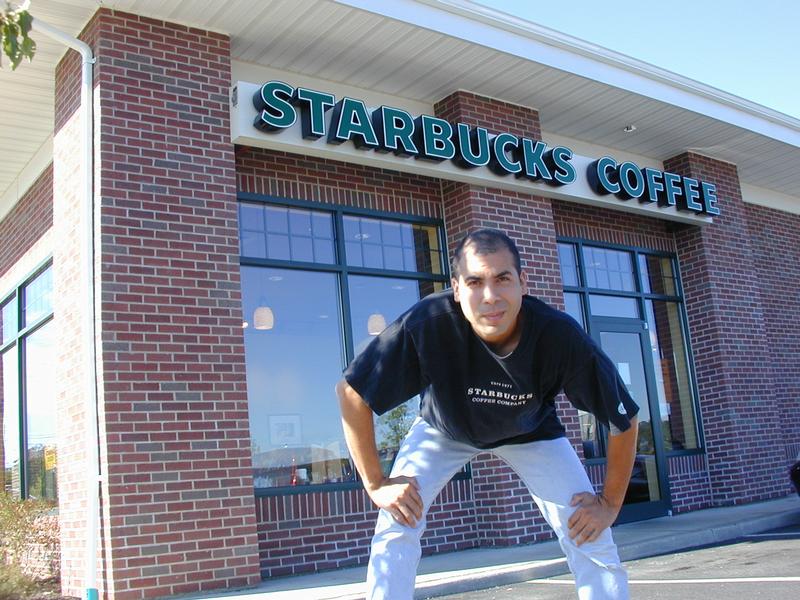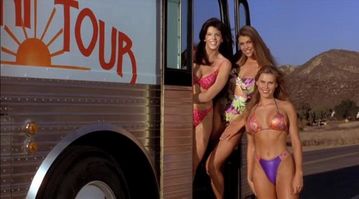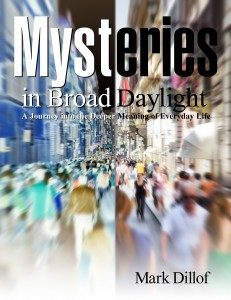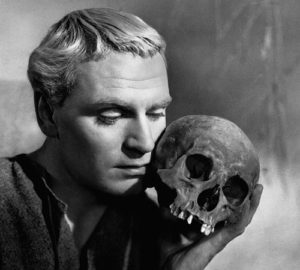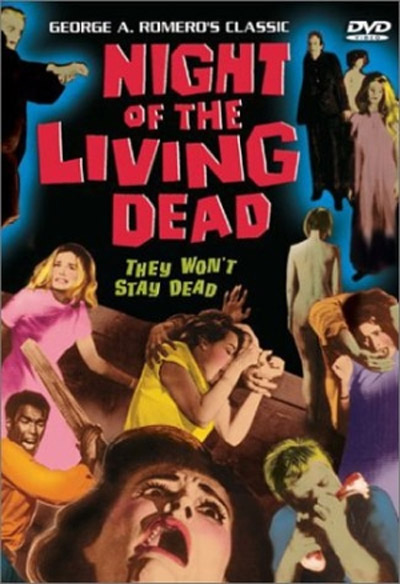“You do not understand. This is a clean and pleasant cafe. It is well lighted. The light is very good and also, now there are shadows of the leaves.”
— Ernest Hemingway, “A Clean, Well-Lighted Place”
There exists a 37 year old man who is obsessed with visiting every Starbucks coffee shop in the world. According to a feature story that appeared in the Wall Street Journal (May 23, 2009), he has already had coffee at over 9000 of them!
The fellow, who calls himself “Winter,” earns enough money from doing freelance computer programming to engage in this expensive lifestyle. And being single allows him the independence to travel. It doesn’t appear, though, that Winter spends a lot of time taking in the sights and the sounds of the world’s many cities, for that would distract him from his quest, or compulsion, to visit all the world’s Starbucks, for there are still many that he has not visited. What, then, can we make of Winter’s odd behavior?
One would think that an adventurer, who also happened to be a coffee connoisseur, would seek out coffee shops that were unique to each city. The globetrotting coffee connoisseur might, for example, visit the Carriage House Café in Ithaca, New York or the Santa Fe Baking Company Café in Santa Fe, New Mexico. Starbucks, on the other hand, is a retail chain, which means consistency of experience. Consequently, one Starbucks is not all that different from another. Their interiors share a similar cheerful aesthetic. The employees are friendly and the coffee is, as Winter states in his interview with the WTJ, consistently good. Spending time in Starbucks is certainly pleasant, but other coffee shops also provide a pleasant experience. Why then has Winter focused on Starbucks? There are several related factors that might help to explain the appeal of Starbucks, not just for Winter, but for many people:
1. Orientation
First of all, modern life can, no doubt, be confusing and disorienting. After all, this is still the Age of Anxiety, as Auden called it. It can feel all the more that disorienting to the traveler far from home. And it can feel even more so to someone with obsessive-compulsive tendencies, which Winter seems to have. There is something comforting, indeed orienting, about sameness, consistency, and familiarity. Spending time in McDonalds restaurants, J.C. Penny’s stores, or any other chain store, that is a staple of every city, can have a similarly psychologically stabilizing effect. Furthermore, each Starbucks is, borrowing the title of a Hemingway story, “a clean, well-lighted place” — the ample outside lightening and general design makes it such — thus providing a haven from the vertigo-inducing existential anxieties that plague the day.
2. Eternality
While frequenting a multi-store establishment, like Starbucks, travelers are likely to forgets what city they are visiting. They are no longer in Rome, London, or Oklahoma City, but in the realm of Starbucks, or in the Starbucks Zone. In that sense, a store like Starbucks coffee shop inhabits a space outside of normal time and space. We might say that Starbucks is like a Platonic Form, and the many actual Starbucks merely participate in this eternal form. We can infer that for Winter, being in a Starbucks is, therefore, not just returning to the familiar, but returning to true reality.
3. Sacredness
Mircea Eliade contends that people in traditional societies distinguish the realm of the sacred from that of the profane. Although modern man has been steadily losing touch with the sacred, residues of “sacred space” still exit, although in degraded forms. Yes, there are still temples, churches, and mosques, and there are places like the battlefield at Gettysburg, but for many secular people today, establishments like Starbucks are as close as they get to evoking the noumenal feelings of a sacred space. Like a small church in a busy city, a Starbucks can be an oasis from the demands and hardships of modern life.
If a single Starbucks can confer, to varying degrees, these benefits, why, then, the need to travel to other ones? Apparently, there is something symbolic in visiting ALL of the Starbucks. What could it be?
The Emergence of Starbuckland
The analysis that follows is inferential. Although I never met Winter, he does reveal himself, to a good extent, on his website,
http://www.starbuckseverywhere.net — and of course in his interviews, not just for the WSJ, but also for the Financial Times and a number of other publications. So here goes…
Winter’s Starbuck travels are a symbolic way of being in many places, i.e., in many cities, and yet always being in the same place, namely Starbucks. He needs to prove to himself, and to other people, that the sacred space known as Starbucks is omnipresent. After all, his website is called starbuckseverywhere. Ideally, he would, if he could, transform the world into a giant Starbucks, for Starbucks is his image of a new Heaven and Earth.
Winter’s image of utopia would appear to be a land in where liberal-minded people sit around drinking coffee, perhaps playing chess or scrabble, maybe discussing big ideas, flirting with members of the opposite sex, etc. No one has any serious commitments. To insure that we remain uncommitted, we must be continually travelling from city to city.
Naturally, without a sense of direction, life would lose all focus, threatening the identity and integrity of the self. Consequently, like Kierkegaard’s aesthete, one chooses an arbitrary goal, such as collecting things or visiting every Starbucks. That is the constitution of Starbucksland, the brave new world that Winter wishes to create. Having assumed the position of Starbuckland’s pope, Winter must confer his blessings on each of Starbucks many temples (coffee shops) dedicated to his version of la dolce vita.
We learn, from the WSJ article, that there have been numerous Starbucks closing. When Winter that a store is closing, he is very anxious to visit it before it closes. If a store closed before he can get to it, he feels distraught. Partly, his sadness might derive from an aesthetic longing to taste all experience everything, and when he is not able to do so, there is a sense of a lost possibility. There may also be a sense that he was not able to bless the store by his presence before it faded into oblivion.
All this may seem strange, but since the advent of postmodernism, there has emerged multiple worlds. The emergence of multinational corporations has further dissolved the traditional sense of borders. Some of these new worlds are virtual, existing in cyberspace. And now some of them inhabit a quasi-virtual realm, as does Starbucksland.
The Transformation of Religious Belief into an Obsessive-Compulsion
We have suggested that Winter is pursuing what C.G. Jung called a modern, degraded form of religious belief. Starbucks has become his secular religion. Also apropos is the fact, as it states in the WSJ article, Winter has a collection of over 10,000 super-hero comic books. It has been noted by many scholars that super-heroes are a modern version of the ancient gods, like those on Mount Olympus.
Furthermore, the WSJ article states that Winter also competes in Scrabble tournaments. Odd though it may sound, Scrabble is akin to a religious rite. The unity of Heaven (the vertical lines of Scrabble) and Earth (the horizontal lines) can be seen in the Jewish star and in the Christian cross. As with crossword puzzles, Scrabble is an effort to unify these two fundamental dimensions of human existence.
Here is the irony of it all: On Winter’s website, there are articles that he wrote that are severely critical of organized religion. Along these lines, he strongly recommends a books by Sam Harris, “The End of Faith,” which connects religious belief to violence. My first thought, on visiting Winter’s website, was “what does this have to do with Starbucks?” But then it all made sense on a psychological level: Winter thinks that he has freed himself from religious beliefs, but he really hasn’t. He has merely converted religion into a relatively innocent and pleasant obsessive compulsion. As Jung noted, for modern man, the Gods have become neuroses.
On the other hand, Winter might be fine with this, for visiting Starbucks is a lot safer than declaring Jihad, or engaging in other forms of fanaticism. The drawback is that drinking coffee at Starbucks lacks the life transforming power of genuine religious experience.
